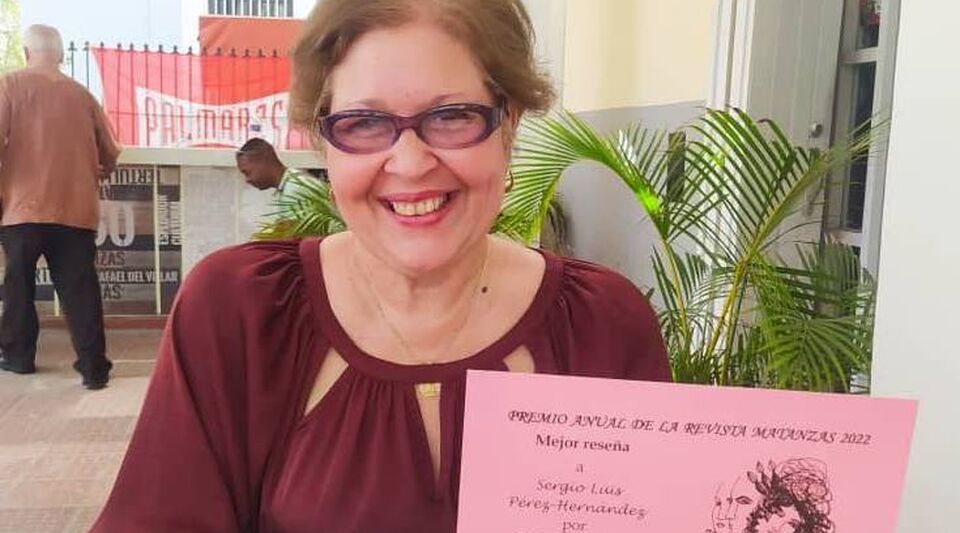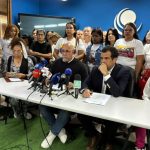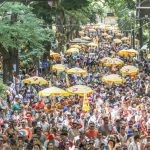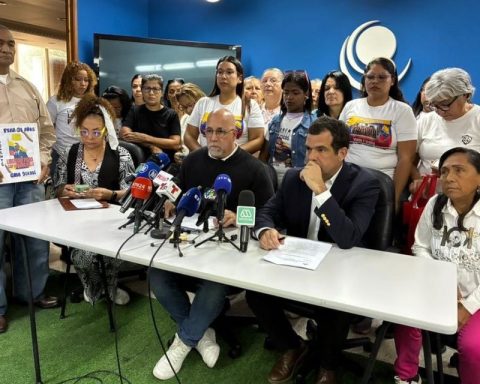Professor Alina Bárbara López Hernández, who was detained for several hours this Thursday after protesting against the arrest of the writer Jorge Fernández Erahas announced that she intends to demonstrate peacefully on the 18th of each month in the Parque de la Libertad in the city of Matanzas, where she was approached by State Security yesterday.
He has advanced it in a long publication on Facebookwhere he offers a detailed account of what happened to him for exercising “a constitutional right in a country without political rights.”
“I was first sitting in the park, but I understood that I had to make the reason for my protest visible,” she narrates. “I improvised a very simple sign right there with my lousy left-handed handwriting and began to walk around the park space.”
The historian says that several people came up to read it and asked her who Fernández was, and she explained briefly. “Two ladies came up and kindly asked me what I was doing, I explained the same way, they introduced themselves as officials of the Provincial Government, which is in the park area, they told me that if I went with them to talk maybe they could call Havana and intercede. At that very moment, Osbel Sánchez, provincial director of Culture, approached him, who was obviously notified because his headquarters are several blocks from the place,” his story continues. The historian accompanied the officials.
“As far as I know, nobody ever objected to Fidel that if Batista was in Havana, they decided to attack a barracks in Santiago de Cuba”
At the government office, she asked the dozen people in front of her to introduce themselves. “Most of them were from the Provincial Bureau of the Party, also located in front of the park: one was the official who deals with the Political-Ideological sphere (very poorly prepared for that function, by the way), another was the official who deals with the issue of defense, another two of those areas, four were government officials, and the director of Culture who was constantly coming in and out, allegedly inquiring by telephone about Jorge’s situation, which was my main objective,” he details.
The professor later realized that this was not the case, that the people she was talking to were “three agents who were in a silver car the whole time and who evidently insisted on her to convince me to give up.” Her response was the same each time: “When they release Jorge.”
From the exchange with officials, López Hernández highlighted several anecdotes, one of them, when “a lady from the Government, somewhat annoyed, asked why if Jorge had been arrested in Havana I was demonstrating in Matanzas” and she replied: “As far as I know, nobody ever objected to Fidel that if Batista was in Havana, they decided to attack a barracks in Santiago de Cuba”.
What was he up to? they asked the historian. “Exercise a constitutional right, that of peaceful demonstration,” was her response.
In the same way, he recounts that the officials wanted to know “about the financing” of the magazine The Young Cuba (LJC), where the teacher had collaborated, but she clarified that she no longer worked there, and explained to them: “The problem of a medium was not receiving financial support, because everyone needs it to function, from Granma and cubadebate until L.J.C., that what should not happen, at least ethically, was a conflict of interest when receiving money from US government agencies with funds for regime change, but that there were agencies that often also financed Cuban government projects and that he did not see any conflict interests, since alternative media are necessary, especially in the case of Cuba with a discriminatory political system”.
“That was a demeaning moment: three trained men trying to subdue three peaceful people by violence”
As usual in this type of case, “the exchange was respectful, sometimes even friendly”, a deference that the three agents who were parked outside and who approached her as she left the government office did not have.
This is how López Herndández continues his story: “They were rude: ‘Alina, come with us’. I flatly refused, I told them that I do not recognize SE [Seguridad del Estado] as an interlocutor and that, according to the criminal procedure law itself, they are not, that this was an illegal arrest. They insisted and I reiterated the refusal. Answer: ‘You know you have to join us.’ I told him they didn’t know me very well.”
At that moment, they tried to take her to the car by force and her daughter and son-in-law, who were nearby, defended her: “That was a demeaning moment: three trained men trying to reduce three peaceful people by violence. With my son-in-law they used a With a key around the neck to immobilize it, my daughter Cecilia, who is a sweetheart in her upbringing, broke her umbrella and her watch, but they couldn’t separate us. Even a dear friend who was there tried to mediate. I yelled for help and I think they were worried, because they stopped grabbing us. They didn’t hit me in the face or body, nor did they hit my daughter, but they pushed us, pulled us, threw us against the wall in an attempt to kidnap us, that’s what they did. after all they were trying to do”.
With her resistance, López Hernández managed not to be transferred and to sit down to “talk” in the same cultural office where she had previously met with the officials. The least aggressive of the policemen, he narrates, “said that he had read my last book and that he noticed that I was even a bit of a fidelista. I clarified that it was not like that, but that I have always recognized that, even founding and directing a system without rights politicians, Fidel gave great importance to sectors such as Health, Education and Social Assistance, currently abandoned, first by the Government of Raúl Castro and currently by that of DC [Díaz-Canel]. I suggested that he review the investment structure so that he would see the huge cuts.”
The agent’s argument was that the demonstration “could cause problems.” “Well, they should have thought about it before approving a Constitution that grants such rights”
The teacher reproached them for the way they had treated her, and that they violated the law they claimed to defend. The agent’s argument was that the demonstration “could cause problems.” “Well, they should have thought about it before approving a Constitution that grants such rights,” she replied, claiming that they had done this “to offer a guaranteed international image,” while within the country “they used people like them to intimidate the public and that they did not dare to exercise their rights”, something in his opinion “perverse”.
It was at that moment that López Hernández was informed that Fernández Era was already free, but the teacher could not go home as she wished, because they had sent a patrol of the National Revolutionary Police to take her to the Playa station, in the same city. “They told me that they had been told by radio that there was a public scandal in the park, and I said that indeed, that I had resisted an illegal kidnapping within the cultural institution where we were and that the scandal had been caused by the three agents,” he narrates.
“I asked if they were going to accuse me of something to call a lawyer. They told me no, that they would only give me a warning. I said that not only would I not sign it but that I do not recognize myself as ‘warned’ because none of them, nor the agents aggressors, nor the President of the Republic, were above the Constitution,” he points out in his text. “There we entered into an interesting exchange when he explained that the warning was not because I demonstrated, but because other people could try to join. Answer: if they do so, they would also be exercising their right. He then argued that acts of violence could occur. Answer: for That would be the PNR, to take care that the peaceful protesters do not go too far, although I clarified that I knew of violent incidents sometimes organized by undercover agents to make situations like this rare.”
When she told the agent who received her that on the 18th of each month she would continue to demonstrate, she ended the conversation and they released her. “I didn’t even read the minutes.”
“It’s not like that man was such a friend of hers, let’s see: has he ever given her a medicine or ten pounds of rice? Answer: ah, so you defend what you defend because they give you a module or a box of chicken? “
Once outside, where her daughter was waiting for her, she told her that two agents sat down to ask her to convince the mother to give up her protest. The anecdote is revealing: “It’s not like that man was such a friend of hers, let’s see: has he ever given her medicine or ten pounds of rice? My daughter’s response: ah, so you defend what you defend because they give you a module or a box of chicken? They hastened to say no and Ceci told them: well, then you must understand that not everything has a price, that my mother acts based on principles and convictions”.
The teacher began to deserve attention by State Security at the same time as the young artists grouped in the event The worst generation censored last october. López Hernández was going to preface a book that would bear the same title and that the regime also prevented from carrying out.
She herself denounced the harassment, asserting: “In Cuba a perverse logic has been enthroned that puts pressure on people for whom there are no reasons to prosecute and who are threatened and coerced for political reasons. I will not lend myself to it. I believe it is necessary to close that scheme”.
López Hernández’s protest did not remain on social networks, because, after receiving several requests from the political police to be interrogated, she presented before the Provincial Prosecutor’s Office of Matanzas a “formal complaint and annulment action against the official citations”. The teacher achieved, with this, that the State Security cancel the summons.
Three months later, inspired by the action from Matanzas, Jorge Fernández Era filed a similar claimannulment for violation of the Criminal Procedure Law, after receiving a summons from the political police, and did not attend the meeting.
The collaborator of The Young Cuba He recounted at that moment that the officer who approached him expressly reminded him not to be inspired by the case of Alina Bárbara López Hernández, warning him that “Matanzas is not Havana.”
________________________
Collaborate with our work:
The team of 14ymedio He is committed to doing serious journalism that reflects the reality of deep Cuba. Thank you for accompanying us on this long road. We invite you to continue supporting us, but this time becoming a member of our newspaper. Together we can continue transforming journalism in Cuba.
















